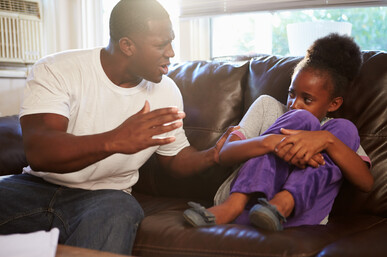Subtle bullying, and where it can happen…
Bullying is a pervasive issue that affects children in various settings, but it can happen at home and online. While much attention is rightfully given to overt forms of bullying, such as physical aggression or verbal abuse, it's crucial to recognise and address subtler forms of bullying that can occur within families or the digital realm. In this blog, we'll explore different aspects of bullying, including 'micro' bullying at home and online bullying, offering insights and strategies for parents to support their children and prevent bullying towards them.
When little comments, have big effects from important and influential adults to your child.
Micro-bullying refers to subtle, yet harmful behaviours exhibited. In this example we are considering its impact by family or close friends towards our children. These actions may include dismissive remarks, constant criticism, belittling, or emotional manipulation. While these behaviours may seem insignificant on their own, they can have a profound impact on a child's self-esteem, emotional well-being, and overall mental health.
Some examples of statements or behaviours that adults might engage in that could be perceived as 'micro' bullying by children are:
Constant Criticism:
"You never get anything right”. “Why can't you be more like your sister?"
Dismissive Remarks:
"Stop being so sensitive. It's not a big deal."
Belittling:
"You're so clumsy. I can't believe you can't even do this simple task."
Emotional Manipulation:
"If you loved me, you would do what I ask without complaining."
Comparisons to Others:
"Look at how well Sarah is doing in school. Why can't you be more like her?" “Your brother is two years younger and can do that!”
Invalidating Feelings:
"You're overreacting. There's nothing to be upset about."
Guilt-Tripping:
"I sacrifice so much for you, and this is how you repay me?"
Gaslighting:
"I never said that. You must be imagining things." (But you did, or something similar)
Ignoring Boundaries:
Continuously invading the child's privacy without respect for their personal space or belongings.
Threatening Language:
"If you don't do what I say, I'll never speak to you again"
It's essential for adults to understand that even seemingly harmless comments or actions can be deeply hurtful to children. Children are sensitive to their parents' words and behaviours and any adult they look up to or believe others do. Repeated exposure to negativity can erode their self-confidence and sense of security, especially from those around home. Comments and behaviours like these can cause significant self-esteem issues, impacting later childhood, such as adolescents going through exams, navigating things such as body image, relationships, career choices and so much more.
To address 'micro' bullying, adults should strive to create a supportive and nurturing environment where open communication and mutual respect are prioritised. This may involve adults reflecting on their own behaviour, being mindful of their words and actions, and actively listening to their children's concerns. Seeking support from a therapist or counsellor can also be beneficial in addressing underlying issues and improving family dynamics.
Our advice is:
Do: Be Mindful of Your Words: Choose your words carefully when interacting with your child. Avoid making dismissive remarks or constant criticism, even if you think they are harmless.
Don't: Dismiss your child's feelings, first attempting to ‘minimize’ your child's feelings is unhelpful. If you don't understand or agree with them, your child might not either. Acknowledge what it feels like or ask. Invalidating emotions can make them feel unheard and unimportant, and they’ll be reluctant to share with you at all.
Do: Practice Active Listening: Take the time to listen to your child's concerns without judgment. Validate their feelings and let them know that their thoughts and emotions are important to you.
Don't: Allow adults to resort to using emotional manipulation tactics to control your child's behaviour or emotions. Manipulative behaviours, such as guilt-tripping or gaslighting, can cause lasting psychological harm.
Do: Offer Encouragement and Support: Provide positive reinforcement and encouragement to boost your child's self-esteem. Focus on their strengths and achievements rather than constantly pointing out flaws or shortcomings.
Don't: Compare Your child to others avoiding comparing your child to their siblings, peers, or unrealistic standards. Constant comparisons can create feelings of inadequacy and resentment in your child.
Do: Lead by Example: Model respectful and compassionate behaviour in your interactions with others, including your child. Show them how to communicate effectively and resolve conflicts peacefully. If they’re doing something you don’t like, make sure you’re modelling what you’re hoping for, and be patient! If they’ve been doing something for a long time, it might take a long time to change.
Don't: Ignore signs of distress, pay attention to signs of distress or withdrawal in your child, such as changes in behaviour, mood, or academic performance. Ignoring these signs can exacerbate their feelings of insecurity and isolation. Best to ‘nip things in the bud’, and ask about them when we see them, just to be sure.
Do: Seek Professional Help if Needed: If you notice persistent negative patterns in your behaviour or your child's emotional well-being, consider seeking support from a therapist or counsellor. Professional guidance can help address underlying issues and improve family dynamics.
Don't: Blame your child for your behaviour. Take responsibility for your actions and avoid blaming your child for your own shortcomings or frustrations. Acknowledge when you make mistakes and apologize sincerely if you hurt your child's feelings.
If you’re struggling to break a habit of doing things like the above or anything mentioned, please do seek advice and support from professionals. You’re a human being too, and maybe you having someone to talk with about this, can help change how you feel and communicate.
Online & Remote Bullying
With the rise of digital technology, online bullying has become increasingly prevalent among children and adolescents. Online bullying, also known as cyberbullying, involves the use of electronic devices and social media platforms to harass, intimidate, or humiliate others.
The anonymity and accessibility of online platforms make cyberbullying particularly insidious, as perpetrators can target their victims from anywhere, at any time. Cyberbullying can take various forms, including spreading rumours, sharing embarrassing photos or videos, or sending threatening messages.
Parents play a crucial role in safeguarding their children from online bullying. It's essential to educate children about the risks of cyberbullying and encourage open communication about their online experiences. Parents should establish clear rules and boundaries for internet and social media use, monitor their children's online activities, and teach them how to protect their privacy and report any instances of bullying.
It's hard, but don’t bow down to pressure of ‘my friends can do this/go on this/it’s fine’. When it comes down to online safety. We need to be parents/carers, not cool like friends.
Support Online Addressing Cyberbullying:
· The NSPCC provides valuable resources and advice for parents on how to keep their children safe online, including guidance on recognizing and dealing with cyberbullying. Their website offers articles, guides, and tools for parents to educate themselves and their children about online safety.
https://www.nspcc.org.uk/keeping-children-safe/online-safety/
· Childnet International offers a range of resources aimed at empowering children, young people, and parents to navigate the online world safely. They provide tips, advice, and educational resources on topics such as cyberbullying, social media, and online privacy.
https://www.childnet.com/parents-and-carers
· The UK Safer Internet Centre provides a wealth of information and resources to promote the safe and responsible use of technology among children and young people. Their website offers guidance for parents on topics such as online gaming, social media, and parental controls.
https://www.saferinternet.org.uk/advice-centre/parents-and-carers
· Internet Matters offers practical advice and support for parents to help their children stay safe online. Their website features articles, guides, and toolkits covering a wide range of online safety topics, including cyberbullying, privacy settings, and screen time management.
https://www.internetmatters.org/
· Parent Zone provides resources and support for parents to help them understand and navigate the digital world with their children. They offer advice on online safety, digital resilience, and managing technology at home, as well as access to online courses and webinars.
These resources offer valuable information and support for parents seeking to protect their children from online bullying and promote safe and responsible online behaviour.
Here are some helpful tips for educating your child about online safety and protecting them from bullying:
These resources offer valuable information and support for parents seeking to protect their children from online bullying and promote safe and responsible online behaviour.
Educating your child about online safety is crucial in today's digital age, where children are increasingly exposed to various online platforms and potential risks such as cyberbullying. Start by having open and honest conversations with your child about the importance of being cautious online and recognising potential dangers. Teach them to safeguard their personal information, including passwords and sensitive details, and to be mindful of what they share on social media platforms. Encourage them to think critically about the content they encounter online and to question anything that makes them feel uncomfortable or threatened. Additionally, emphasize the significance of treating others with kindness and respect, both online and offline, and to speak up if they witness or experience any form of bullying. By empowering your child with knowledge and strategies to navigate the online world safely, you can help protect them from potential harm and promote positive digital citizenship.
Set clear rules and boundaries for internet and device usage, including appropriate time limits and guidelines for online behaviour.
Monitor your child's online activity and regularly review their privacy settings on social media platforms and other online accounts.
Teach your child to recognize signs of cyberbullying, such as mean or threatening messages, exclusion from online groups, or sudden changes in behaviour.
Encourage open communication with your child and let them know they can always come to you if they encounter any problems online.
Familiarise yourself with the platforms and apps your child uses and stay informed about the latest trends and potential risks.
Role-play different scenarios with your child to help them practice responding to cyberbullying and seeking help from a trusted adult.
Teach your child about the importance of respecting others' privacy and not sharing personal or sensitive information online.
Stay up-to-date with resources and educational materials on online safety and bullying prevention and share relevant information with your child and their school.
Encourage your child to cultivate positive online relationships with friends and peers and to report any instances of bullying or inappropriate behaviour to the appropriate authorities.
Lead by example and demonstrate responsible and respectful online behaviour in your own interactions and communications.
Identifying Other Forms of Bullying
In addition to ‘micro’ bullying and online bullying, other forms of bullying may occur in various settings, such as school or social environments. These may include physical bullying, verbal bullying, social exclusion, or discriminatory behaviour based on factors such as race, gender, or sexual orientation.
Parents and carers can be vigilant in identifying signs of bullying in their children, such as changes in behaviour, mood, or academic performance. Encouraging children to speak up about their experiences and offering support and validation can help address bullying effectively.
Recognising and addressing bullying requires a multifaceted approach that acknowledges the different forms it can take. By fostering a culture of empathy, respect, and accountability both at home and online, parents can play a crucial role in creating a safe and supportive environment for their children to thrive.








